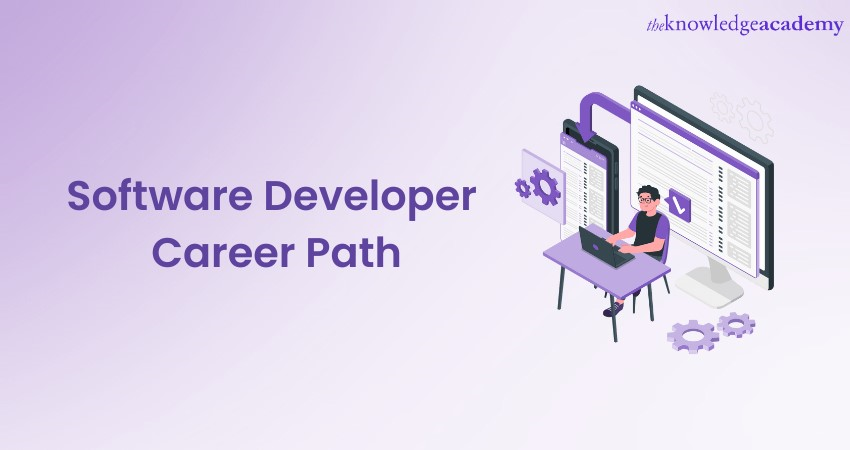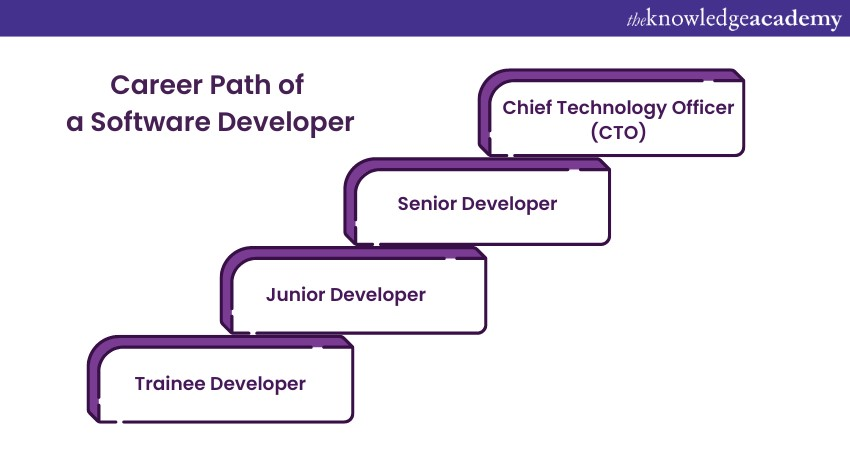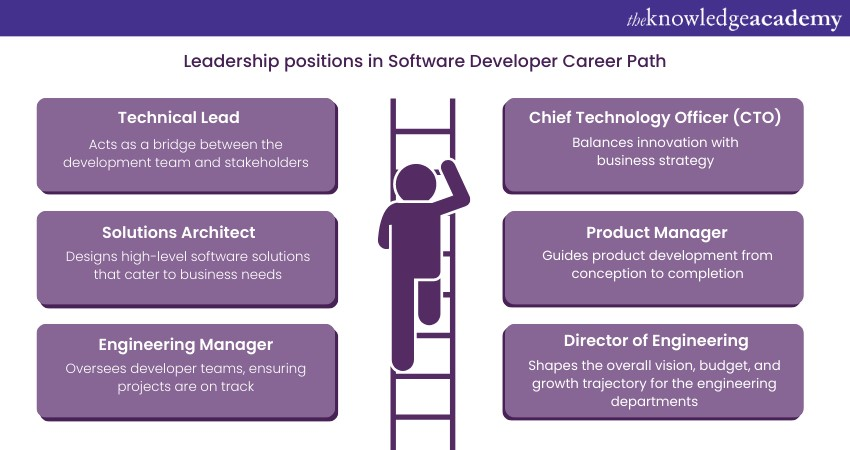We may not have the course you’re looking for. If you enquire or give us a call on 01344203999 and speak to our training experts, we may still be able to help with your training requirements.
Training Outcomes Within Your Budget!
We ensure quality, budget-alignment, and timely delivery by our expert instructors.

Are you an aspiring developer for whom charting a career trajectory can seem daunting? If yes, Understanding the Software Developer Career Path is crucial for you if you want to harness opportunities and ensure your sustained growth in this field.
Today, Software Development can stand out as one of the most sought-after and evolving professions. According to Glassdoor, the salary of a Software Developer in the United Kingdom alone is £46,372/yr. So, charting a Software Developer Career Path can be ideal for you.
Want to know how? Read this blog to get a detailed overview of the Software Development Career Path. Also, learn how to lay the groundwork for becoming a Software Developer and more. Read ahead to know more!
Table of Contents
1) Who is a Software Developer?
2) Software Developer Career Path: An overview
a) Laying the groundwork: Educational and skill prerequisites
b) The early stages: Beginning your journey in development
c) Ascending the ranks: From junior to Senior Developer
d) Branching out: Specialised roles in Software Development
e) Leading the charge: Advanced and leadership positions
f) Staying relevant: The role of continuous learning
g) Charting a path beyond development: Alternative career trajectories
3) Conclusion
Who is a Software Developer?
A Software Developer is a skilled professional essential to creating and maintaining software applications. They can be a versatile professional with coding prowess, adept problem-solving skills, a collaborative mindset, a commitment to ongoing learning, and focusing on making sure of the quality and reliability of software applications. These qualities collectively define the Software Developer Career Path in today's dynamic and fast-paced technological landscape.
Their role encompasses various facets critical to the Software Development lifecycle:
1) Coding proficiency: Software Developers are adept at multiple programming languages, like Java, Python, or JavaScript. This proficiency allows them to write efficient, functional code that forms the backbone of software applications.
2) Problem-solving skills: A core aspect of a developer's expertise lies in their ability to dissect complex problems and devise practical solutions. This problem-solving understanding is vital for addressing challenges throughout the development process.
3) Collaboration and communication: Effective teamwork is paramount in Software Development. Developers work closely with team members, requiring strong collaboration and communication skills to ensure seamless integration of individual contributions.
4) Continuous learning and adaptability: The tech landscape is ever-evolving, demanding developers stay abreast of new technologies and methodologies. A commitment to constant learning and adaptability ensures developers remain effective and innovative.
5) Testing and quality assurance: Beyond coding, developers engage in rigorous testing procedures to guarantee software functionality and quality. This includes identifying and rectifying bugs and ensuring a reliable and seamless end-user experience.

Software Developer Career Path: An Overview

A Software Developer's Career Path is a dynamic progression filled with opportunities, challenges, and continuous learning. From the foundation-laying days of basic programming to the cutting-edge projects, every step in a developer's journey is pivotal.
However, before stepping on the journey to become a developer, you have to select the right programming language for you. You have to understand algorithms or build your first application. Moreover, you must have a creation and problem-solving mindset if you want to become a Software Developer. But these are just the foundational steps; there’s more to the Software Developer Career Path. Let's find out:
Unlock your potential in the tech world with our Software Development Lifecycle Training .
Laying the groundwork: Educational and skill prerequisites
Before you start your journey as a Software Developer, you must be aware of the following requirements:
a) Formal education: You need to have an engineering degree or a degree in some other discipline. You can also attend technical schools where they offer specialised courses that focus on specific Programming Languages or tools.
b) Certifications: Obtaining a certification is valuable for demonstrating expertise in particular areas, such as Java, Python, or cloud platforms. You also need to continuously update yourself as technology evolves. Thus, a certification can be helpful.
c) Foundational skills: You need to have a good command of programming languages like Java, Python, and C++, among others. You should also have the ability to break down complex issues and develop solutions.
d) Soft skills: To become a Software Developer, you should know how to effectively interact with team members, stakeholders, and sometimes, end-users. Collaboration is key in most Software Development projects. Hence, teamwork is a necessary skill to have if you want to become a Software Developer. Moreover, practising critical thinking helps you to evaluate multiple solutions to find the most effective approach.
e) Practical experience: Try to participate in as many internships as possible. Internships offer real-world exposure and often act as stepping stones to full-time roles. Moreover, building own applications or software showcases initiative and passion.
f) Networking: Building relationships within the tech community can open doors to job opportunities and collaborations for you. Also, engaging in forums, attending tech meetups, or joining developer communities can also expand your professional network.
g) Understanding industry trends: Awareness of emerging technologies, methodologies, and tools ensures that your skills remain relevant. Staying informed about market needs can also guide your educational and skill-building pursuits.
The early stages: Beginning your journey in development
There are several stages before you become a pro in Software Development. Let’s have a look at these stages:
1) Entry-level positions: Before becoming a professional Software Developer, you need to have hands-on experience and mentorship within established teams. Junior Developer is the first role that every Software Developer has to take up. This role focuses on smaller tasks while under supervision.
2) Skill refinement: Gaining practical knowledge while being at work helps you in tackling real-world problems. This also enhances your technical skills. You can also seek guidance from professional developers who can guide you, provide feedback, and share best practices.
3) Building a portfolio: Investing your time in doing personal projects helps you to demonstrate skills, creativity, and passion to the interviewer.
4) Collaboration and team dynamics: Gain exposure to Project Management and team strategies by participating in team meetings. Moreover, understand tools like Git for collaborative code management.
5) Continuous feedback: Learn from peers, spot mistakes, and adapt coding styles. Also, understand areas of improvement and set your career goals.
6) Participate in community events: Engage in workshops, hackathons, and networking events. Sites like Stack Overflow offer platforms for questions, solutions, and community building. Participate in these online forums so that you can have additional knowledge on upcoming technologies.
7) Understanding development methodologies: Familiarise yourself with popular methodologies like Agile, Scrum, or Waterfall to streamline work processes.
8) Specialisation: You should choose your area of expertise based on interest and market demand. Web Development, Mobile App Creation, Backend Systems, etc., are some of the areas where you can choose from.
a) Advanced training: Pursue courses or certifications in the chosen niche for deeper expertise.
Ascending the ranks: From junior to senior developer
The progression from a Junior Developer to a senior position is not just a journey of technical skills but also one of personal growth, leadership, and an understanding of broader business contexts. Aspiring candidates need to follow this Software Developer Career Path:
1) Consequences of gaining experience: With each project, you will see that your understanding of coding, problem-solving, and the intricacies of software design will deepen. Over time, experience becomes an invaluable asset, allowing one to approach problems with seasoned intuition.
2) Technical proficiency: As the career path for Software Developers advances, you will gain experience in specific technologies or methodologies. This will enable you to tackle more complex projects and challenges. This expertise may span multiple programming languages, frameworks, or architectures.
3) Mentorship and leadership: After you have transitioned to a senior role, it will often mean guiding junior team members. Mentoring will involve sharing accumulated wisdom, ensuring that best practices are followed.
4) Broadening horizons: Senior developers often find themselves interfacing with other departments, like marketing or product management, to ensure software aligns with broader business goals.
5) Problem-solving and innovation: Beyond just coding, if you are a Senior Software Developer, you will be expected to devise innovative solutions. You will also have to optimise existing systems and think strategically about the software’s long-term evolution.
6) Decision- making: As you ascend ranks, you as a developer play a pivotal role in critical decisions, be it selecting a technology stack, determining project timelines, or establishing best practices.
7) Continuous learning: The tech world is ever-evolving. To maintain your seniority, you, as a developer, must be committed to ongoing education. You also must explore emerging technologies and understand how they fit into the current landscape.
Register now for our comprehensive Software Engineering Training to enhance your technical skills
Branching out: Specialised roles in Software Development
Your next step in a Career path for Software Developer is to branch out to specialised roles. Some of these roles are:
1) Full-stack Developer: As a Full-stack Developer, you master both Front-end (user interfaces) and Back-end (servers, databases) Development.
2) Front-end Developer: Focuses on creating visually appealing and functional user interfaces.
3) Back-end Developer: Concentrates on server-side logic, databases, and application infrastructure.
4) Mobile App Developer: Specialises in creating software for mobile devices, like smartphones and tablets.
5) DevOps Engineer: They bridge the gap between development and operations, emphasising tools, automation, and continuous integration/continuous deployment.
6) Data Scientist: Utilises algorithms and data analysis to produce actionable insights from vast data sets.
7) UX/UI Designer: Ensures software is user-friendly, intuitive, and aesthetically pleasing.
8) Quality Assurance (QA) Engineer: Dedicated to identifying bugs and ensuring software quality through rigorous testing.
9) Security Specialist: Focuses on ensuring software is free from vulnerabilities and threats.
10) Game Developer: Combines creativity and technical skills to develop interactive video games.
Leading the charge: Advanced and leadership positions
After you become a Software Developer and begin to progress in your Career Path for Software Developer, you often ascend into roles that will both test your technical skills as well as your leadership abilities. Here are some examples of the same:

1) Technical Lead: Acts as a bridge between the development team and stakeholders, ensuring projects align with technical specifications and standards.
2) Solutions Architect: Designs high-level software solutions that cater to business needs while ensuring integration with existing systems and scalability for future demands.
3) Engineering Manager: Oversees developer teams, ensuring projects are on track, providing mentorship, and managing personnel.
4) Chief Technology Officer (CTO): Part of the executive team, the CTO sets the technological direction for the company, balancing innovation with business strategy.
5) Product Manager: While not always a technical role, they guide product development from conception to completion. They are also responsible for ensuring that software solutions meet market demands.
6) Director of Engineering: At this strategic level, they shape the overall vision, budget, and growth trajectory for the engineering departments.
Staying relevant: The role of continuous learning
Staying updated is not just an advantage—it's a necessity for all Software Developers. This continuous learning remains at the heart of career longevity and relevance. This is how continuous learning can help you in your career path:
1) Emerging technologies: With the advent of new programming languages, frameworks, and tools, developers must be proactive in familiarising themselves to remain adaptable and versatile.
2) Industry trends: Understanding shifts in tech trends, such as the move to Cloud Computing or the rise of Artificial Intelligence, ensures that developers can align their skills with industry demands.
3) Certifications: Earning updated certifications not only enhances skills but also boosts credibility in specialised areas.
4) Soft skills: Beyond technical acumen, honing skills like communication, teamwork, and problem-solving aids in effective collaboration and leadership.
5) Networking: Engaging with peers, attending conferences, and joining tech communities provide insights into the latest best practices and innovations.
6) Online courses and workshops: Platforms offer courses on a myriad of topics, ensuring developers can conveniently upskill.
Charting a path beyond development: Alternative career trajectories
Software Development provides a foundational skillset so that you can have the launchpad for alternative Software Developer Career Paths:
1) Technical Writing: Leveraging coding expertise to create user manuals, documentation, and how-to guides is a good career choice for Software Developer.
2) Tech Consultancy: If you want to be in tech consultancy, then you need to use deep industry knowledge to advise businesses on technology adoption, implementation, and optimisation.
3) Project Management: Overseeing projects from conception to completion, ensuring timelines, resources, and objectives align.
4) Sales and Marketing in tech: You can also promote and sell technology products, utilising a clear understanding of their features and benefits.
5) Tech Entrepreneurship: You can use your skills as a Software Developer and establish a startup. It is a great way of translating your tech ideas into a viable business.
Conclusion
The Software Developer Career Path is diverse and dynamic. It offers numerous opportunities for growth and specialisation. By continuously evolving, embracing learning, and considering alternative trajectories, you can navigate a fulfilling and adaptable journey in this dynamic tech industry.
Master the art of software design and architecture with our Software Design And Architecture Training.
Frequently Asked Questions

Embark on a Software Development Career Path starting as an entry-level developer. Progress to roles like junior, mid-level, and senior developer. Specialise in web or mobile development, become a team lead, and eventually advance to roles such as software architect or engineering manager.

A bachelor's or master's in IT, computer science, or a related field is essential. Solid programming skills in languages like Java, Python, or C++. Proficiency in software development tools and frameworks. Effective communication, problem-solving skills and collaboration abilities are crucial in a collaborative development environment.

The Knowledge Academy takes global learning to new heights, offering over 30,000 online courses across 490+ locations in 220 countries. This expansive reach ensures accessibility and convenience for learners worldwide.
Alongside our diverse Online Course Catalogue, encompassing 17 major categories, we go the extra mile by providing a plethora of free educational Online Resources like News updates, Blogs, videos, webinars, and Interview Questions. Tailoring learning experiences further, professionals can maximise value with customisable Course Bundles of TKA.

The Knowledge Academy’s Knowledge Pass, a prepaid voucher, adds another layer of flexibility, allowing course bookings over a 12-month period. Join us on a journey where education knows no bounds.

The Knowledge Academy offers various Software Engineering Courses including Systems Engineering Training, Software Development and Lifecyle Training etc. These courses cater to different skill levels by providing comprehensive insights into How to Become a Software Tester.
Our Programming and DevOps blogs cover a range of topics related to Software Developer Skills offering valuable resources, best practices, and industry insights. Whether you are a beginner or looking to advance your Software skills expertise, The Knowledge Academy's diverse courses and informative blogs have you covered.
Upcoming Programming & DevOps Resources Batches & Dates
Date
 Software Development Lifecycle Training
Software Development Lifecycle Training
Thu 23rd May 2024
Thu 12th Sep 2024
Thu 26th Dec 2024







 Top Rated Course
Top Rated Course


 If you wish to make any changes to your course, please
If you wish to make any changes to your course, please


